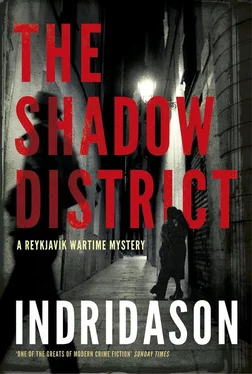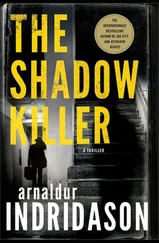Smiling to himself at the thought of his boorish countrymen, Konrád kept going back in time, looking for information about a girl who might have paid a heavy price for that new-found freedom. He had got back as far as 1941 when he discovered two loose handwritten sheets. They weren’t in a file and lacked both date and author; presumably they had ended up in the wrong place when someone was clearing out old files or in the midst of a move. Perhaps someone had just forgotten to throw them out. The handwriting was neat and legible, and the pages appeared to sum up an interview with a man who was not identified by name. It wasn’t an official report, more like a policeman’s notes to himself, stating that the man had been brought in for questioning and held in the cells on Skólavördustígur under strong protest. During questioning it had emerged that he knew ‘the girl up north’ — as it was phrased — and had taken some mending to a shop called The Stitch, where Rósamunda used to work. He was a student of Icelandic and history at the University of Iceland, it continued, with a special interest in folklore and legends, on which he was writing a thesis. Added at the bottom in different ink but in the same hand was a sentence which seemed strangely at odds with the dry tone of the preceding account, like a heartfelt outburst by the author: What happened was a tragedy.
That was all that the pages told him. Konrád tracked down some typewritten reports signed by Flóvent, and, comparing them to the notes, concluded that the handwriting on the loose sheets of paper could well be his. He continued rummaging through the filing cabinets, pulling out drawers and leafing through reports, but turned up nothing else of interest. Although the reference to the girl up north was puzzling, it appeared that the student in question had been suspected of Rósamunda’s murder. Evidently, the case had not been solved by his arrest, though, since it never went to court and nobody was ever found guilty. It was as if the inquiry had been abruptly terminated. Was there any chance that the suspect could have been linked to the influential family Petra had mentioned? A member of parliament was involved, after all. Could the investigation have been dropped as a result of political pressure?
A student of Icelandic and history.
A student.
Was this unnamed suspect the student Thorson had muttered about as he was leaving Petra’s home?
Two hours later, when it was clear that he was getting nowhere, Konrád abandoned his ferreting and went to see Marta. She told him glumly that they were making next to no progress with the inquiry. On her desk was a pile of recordings from CCTV cameras near Thorson’s home, labelled with the names of a shop, a bank and a school.
‘We’re starting to slog through this lot,’ said Marta, gesturing to the pile as she pulled on her coat. ‘In case we spot any of the usual suspects. Apart from that we haven’t a clue what we’re looking for.’
‘Have fun,’ said Konrád.
‘Have you got anything for us?’
‘Nothing concrete.’
‘We’re starting to think that the old guy took his own life,’ said Marta.
‘Smothered himself? Is that possible?’ asked Konrád incredulously.
‘Think about it, Konrád,’ said Marta. ‘He was old and knackered.’ She was late for a meeting, and clearly had no time to talk. ‘We’ve hit a brick wall. We can find no one who had any reason to harm him. There was no forced entry. Nothing was stolen. Motive? Absolutely no idea. He had no family here, no circle of friends as far as we know. Nothing to look forward to except spending the rest of his days mouldering away in a nursing home. See what I mean?’
‘Wrong,’ said Konrád. ‘Totally wrong. That’s a million miles from what was going on in his head. On the contrary, he had every reason to live. He was actively engaged in looking into that cold case involving the girl behind the theatre, a case he himself investigated back when he was a military policeman during the war. And I have reason to believe he was making progress with his enquiries. That’s where you’ll find the reason for his death. There’s your motive.’
‘All right,’ said Marta. ‘Could you send us a short report? We’ll take a look at it.’
The phone on her desk was ringing and the instant she picked it up, her mobile chimed in.
‘My report-writing days are over,’ said Konrád curtly. ‘You know where to find me.’
He left.
Afterwards, wondering if he could glean any more information from Vigga, he paid another visit to her nursing home. The corridors were alive with residents on the move, many of them inching along on Zimmer frames; they were overtaken by members of staff dashing to and fro with trays and bowls. The air was filled with music from a radio. Vigga was lying in her usual spot, oblivious to it all. Reluctant to disturb her, Konrád took a seat beside her bed. The carer he consulted had told him she never received any visits, so people had been surprised when an elderly gentleman had come to sit with her a couple of weeks ago, and now Konrád had turned up twice.
He had been sitting there for twenty minutes or so, flipping through an unbelievably tedious lifestyle magazine, when he heard the old woman stirring. He put down the magazine. Vigga opened her eyes and looked at him.
‘Vigga?’ said Konrád.
‘Who are you?’ she asked weakly.
‘My name’s Konrád. I came to see you the other day.’
‘Oh?’
‘Do you remember?’
Vigga shook her head. ‘Who are you?’ she asked again.
‘My name’s Konrád. Naturally you won’t remember me, but I used to live near you in the old days.’
Vigga showed no sign of recognising him, either from the past or from his recent visit.
‘I came to see you the other day to ask about a visitor you had, a man called Stefán. He was stationed here during the war and went by the name of Thorson; he was in the military police. Do you remember his visit at all? Do you recall talking to him?’
‘Do I know you, Mr—?’ asked Vigga, suddenly turning formal.
‘No, I doubt you’d remember me — it was too long ago. This Thorson wanted to know if you could help him with a case he was investigating during the war — a young woman found strangled behind the National Theatre. When I came to see you recently, you mentioned another —’
‘Are you from the management?’
‘No, I’m just visiting,’ said Konrád. ‘I don’t know if you talked to Thorson at all, but you told me about another girl, a girl who’d vanished. They never found her bones, you said, and you mentioned the huldufólk .’
‘She was attacked by one of the huldufólk .’ With difficulty, Vigga raised herself up from her pillow, her eyes resting on Konrád’s face.
‘Who?’
‘The girl up north. Hrund, her name was. They never found her. She threw herself into the waterfall. Was your father a medium?’
‘No,’ said Konrád, disconcerted.
‘Yes, he was.’
‘No, he—’
‘The fake medium!’
‘No, he wasn’t. He was a member of the Society for Psychical...’
‘He was a crook,’ hissed Vigga, lying back on her pillows. ‘He was a dirty, no-good piece of scum.’
‘Vigga?’
She didn’t answer. Her eyelids drooped again.
‘Vigga?’
Three quarters of an hour later Konrád stood up and left. Vigga was out for the count. He had sat by her side, waiting for her to wake up so he could ask her more about the girl, Hrund. Everything she’d said was a mystery to him. The huldufólk had attacked Hrund and she’d thrown herself into a waterfall. He had no idea what she was talking about. Was Hrund the same girl she had referred to last time, the one who had vanished and never been found?
Читать дальше












